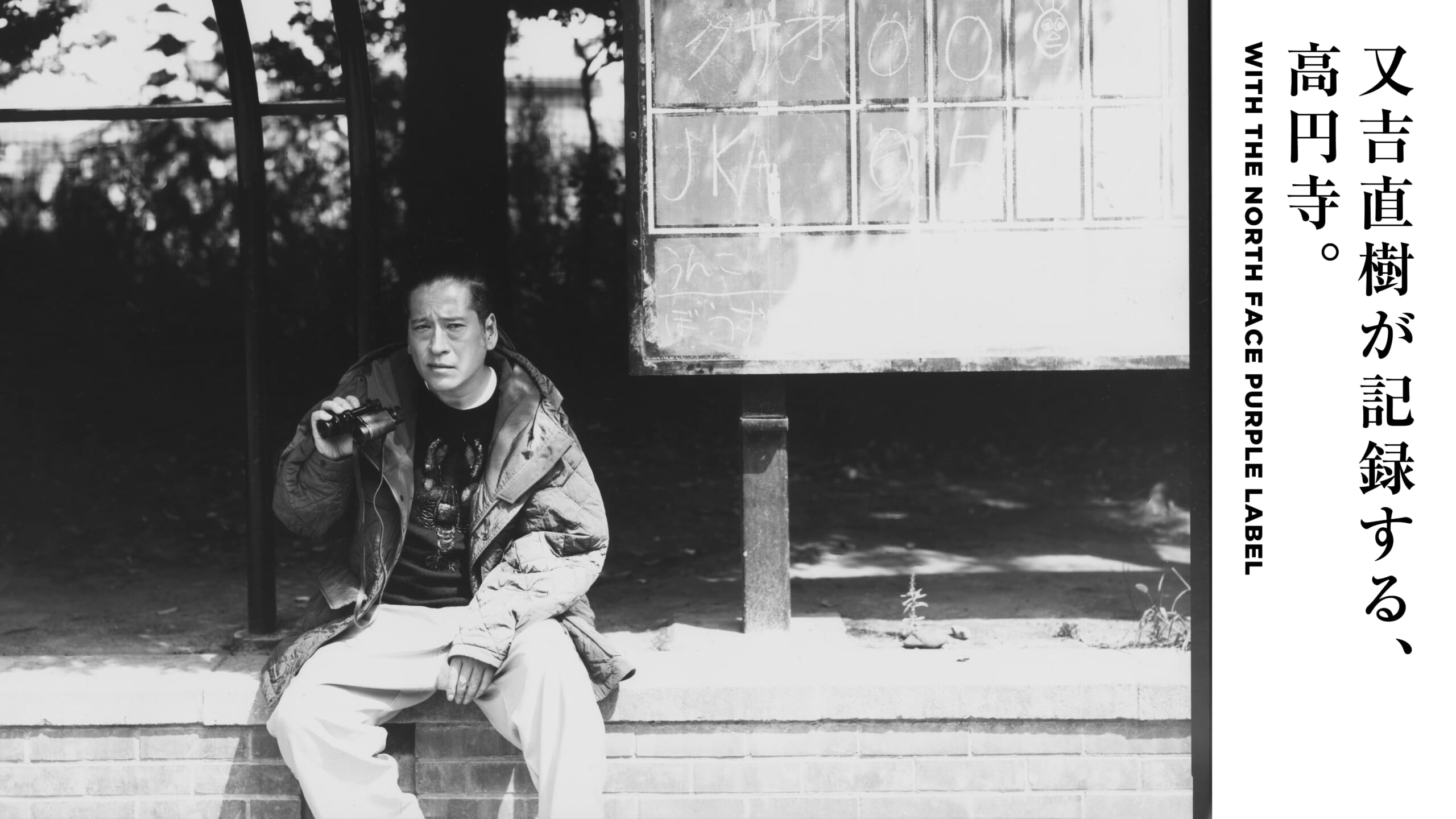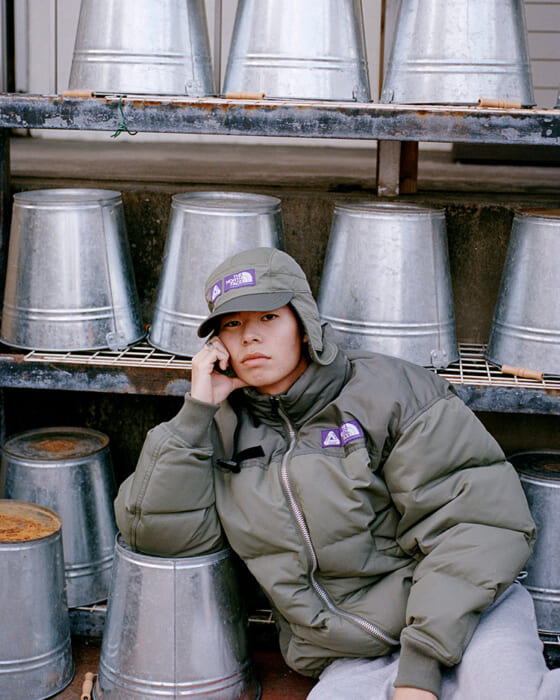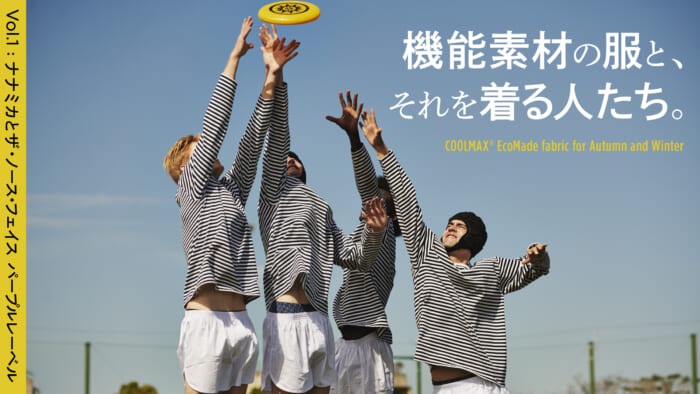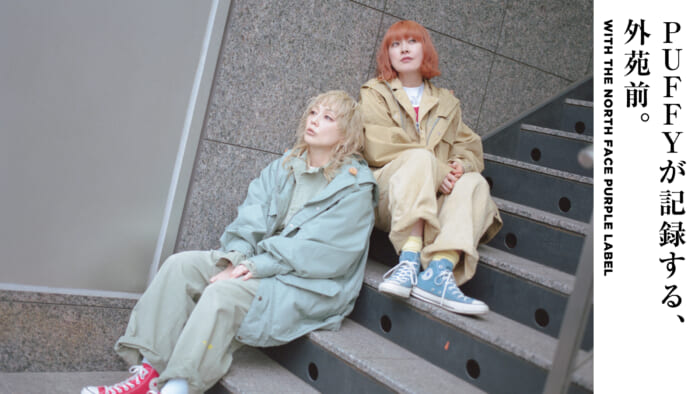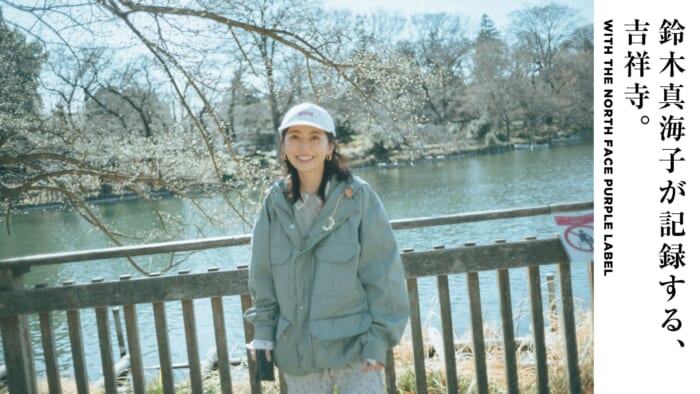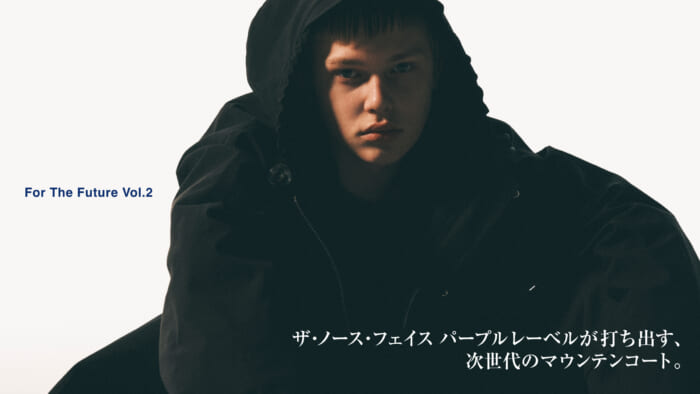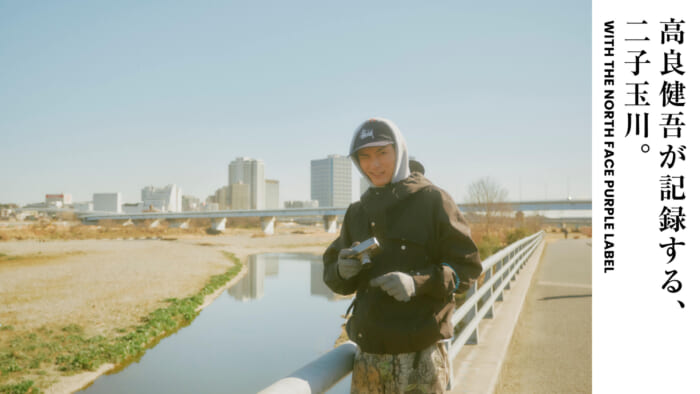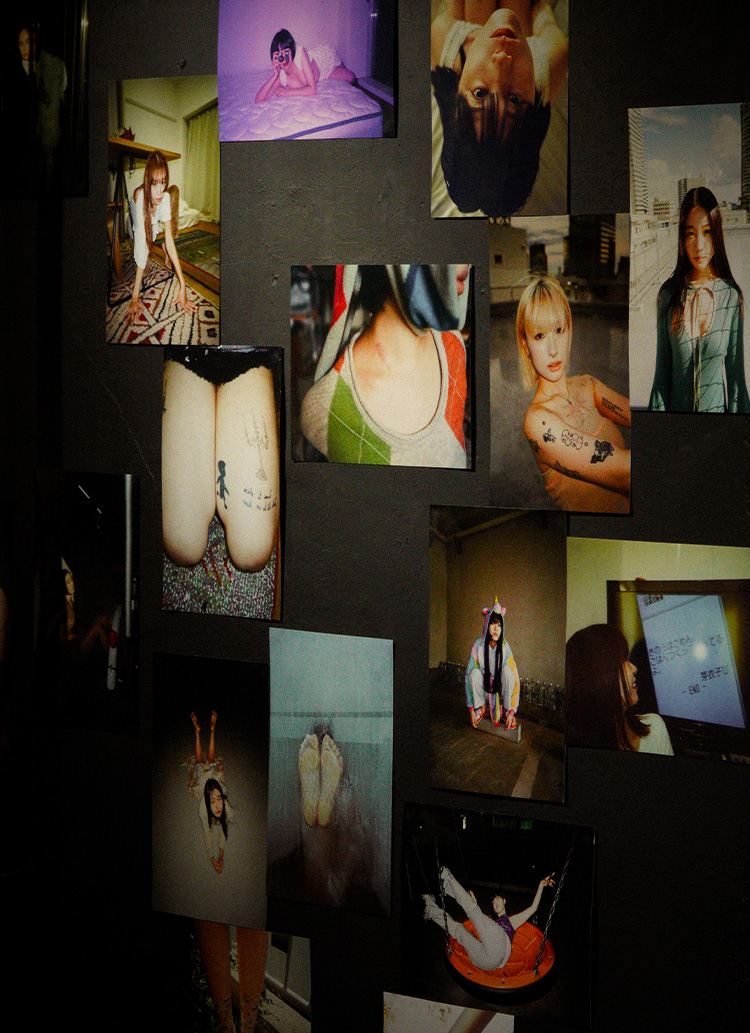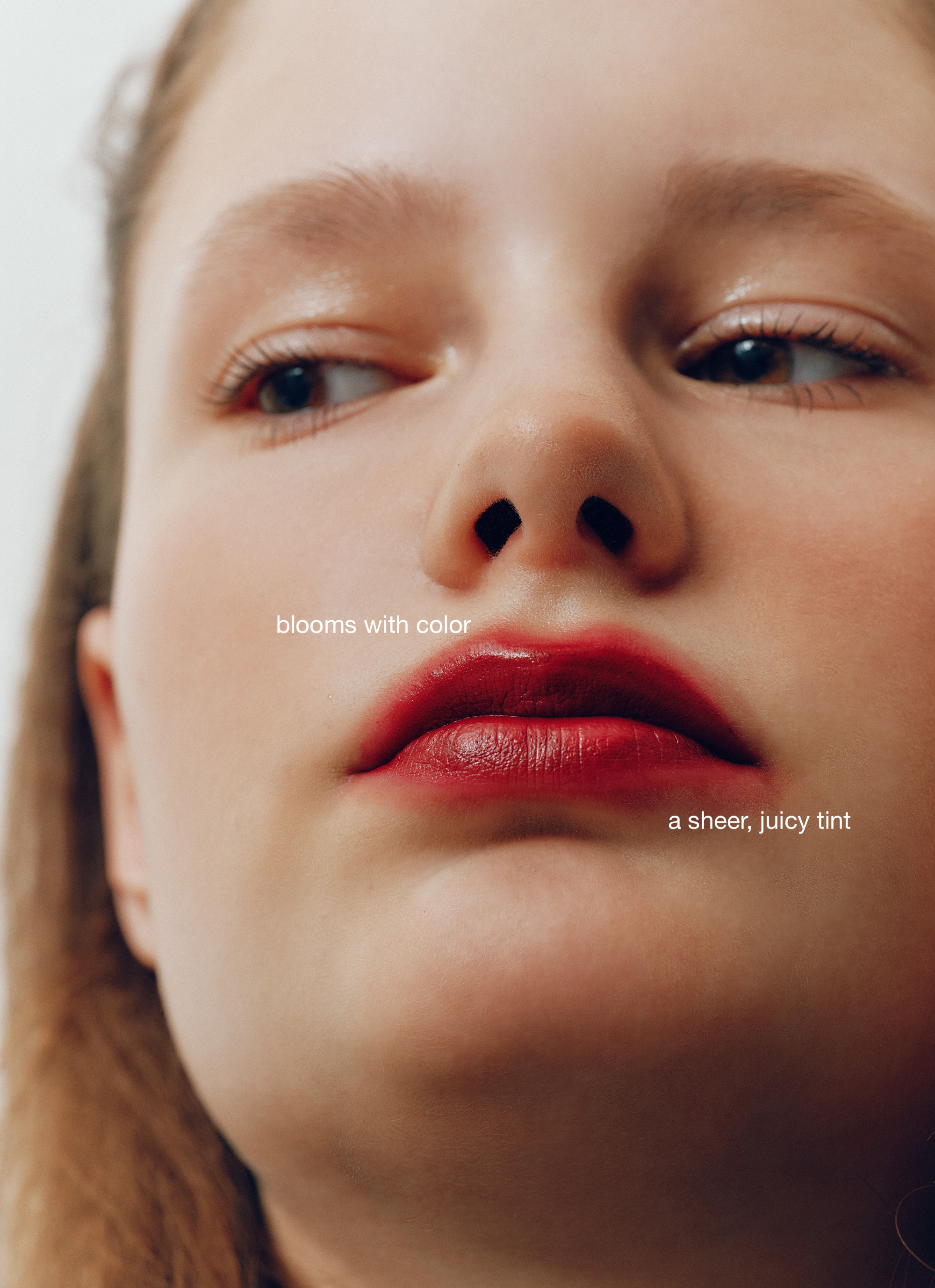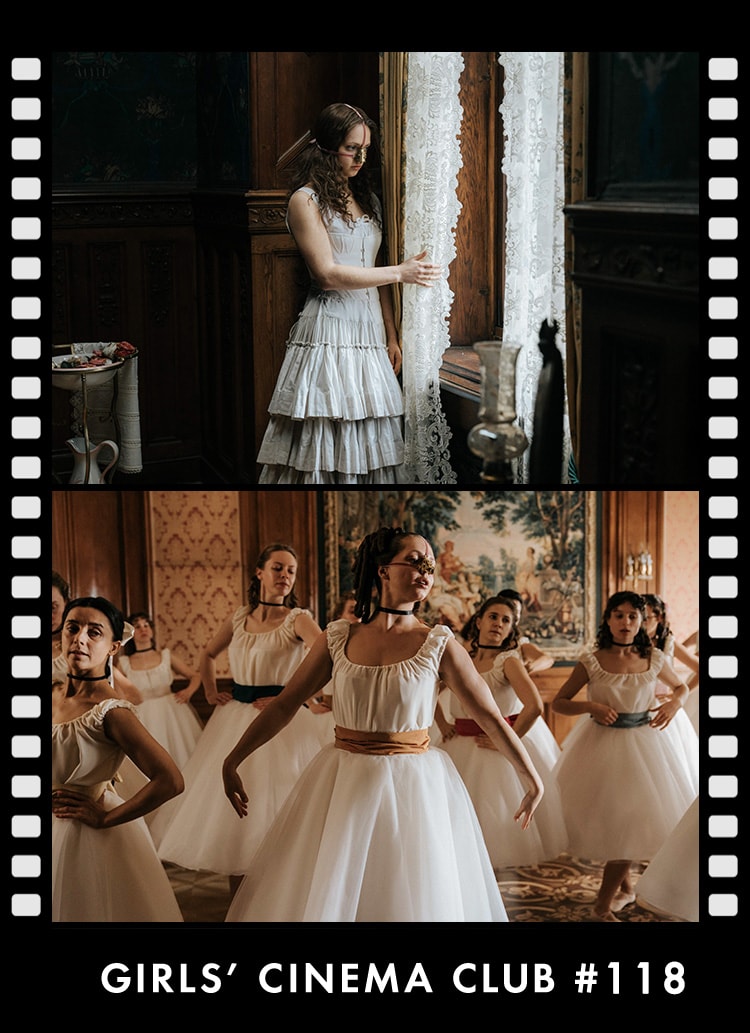A town of humanity where I spent my down-home days.
Even in a city lined with buildings, there is nature everywhere, such as parks and roadside flowers and trees. The North Face Purple Label" cherishes such small nature and creates outdoor wear that blends in with the city.
Among these, the mountain parka is known as a standard item that has been a staple since the brand's birth. Usually made of "65/35 Bay Head Cloth," a 65:35 blend of recycled polyester and organic cotton, the new version is a quilted recycled nylon taffeta. The padding is made of PRIMALOFT® Black Insulation, a lightweight fabric with excellent heat retention properties, and it is also water repellent. It also has four large pockets that can easily fit a book, so you don't need a bag when you go for a walk.
Naoki Matayoshi, clad in the brand's signature clothing, went to Koenji, where he used to live and where he still goes once a month. In keeping with The North Face Purple Label's key concept of "documenting the nature that only the city can offer," we asked Matayoshi to record the city and its scenery in his photographs.
Did you live in Koenji right after you moved to Tokyo?
Matayoshi: After moving to Tokyo, I lived first in Mitaka and then in Koenji. I had liked clothes since I was in Osaka, so I often saw them in magazines. I had a longing to live in Koenji. At first, I lived in an apartment with only a shower and a rent of about 50,000 yen. After that, I was evicted because the building was going to be demolished, and the next rent was 30,000 yen for an apartment with no bathroom and shared toilets. I was told I could clean the bathroom for 25,000 yen, and I said, "I'll do it," but I hardly did anything at all (laughs). I was in the middle room, six tatami mats with no light and no air conditioner.
That was before you were on TV, wasn't it?
Matayoshi: It was a long time ago. There was a soccer game at a nearby park, and when a junior came to my apartment to pick me up, he pulled up. He said, "You live here? (laughs).
How long have you lived in Koenji?
Matayoshi: I think it's about 5 years total in two places.
Today, I gave you my camera and asked you to take pictures of Koenji, which is such a memorable place.
Matayoshi: I went to the park today to take a walk, practice soccer, and think of a story to tell on my own. I hadn't been there in a long time, and it's become a really nice, beautiful park. It used to be a dreary, dark, old, kind of scary park. It was kind of depressing (laughs). Maybe I was just not very excited at the time.
Is Koenji a symbol of hard times?
Matayoshi: Maybe so ...... but it was fun. It was a town where even young people who couldn't find what they wanted to do at a young age didn't float away, and there was an atmosphere of "that's fine, isn't it?" It was a comfortable place to live. And although I could pay 50,000 yen for rent, I spent the remaining 25,000 yen on books, CDs, secondhand clothes, and other things I liked and enjoyed living there. This was a source of fertilizer for my later work.
Is there anyone who has left a lasting impression on you?
Matayoshi: A Chinese woman who lived upstairs. She would fight with her boyfriend and cry, saying, "Nobody understands how I feel." I knew that she got up early every morning to go to work, so I told her, "I understand, and I'm doing my best" (laughs). When the fights got heated up, I would knock on the ceiling and they would quiet down, saying something like, "Look!
That's a great story. Do you sometimes use episodes from your Koenji days in your novels?
Matayoshi: The female punk rocker you depicted in your novel "Gekijo" is almost a true story. I have already written about Koenji-like things in "Spark" and "Gekijo," but I would like to write a novel set in Koenji someday. I already have a title in mind, and I'm thinking of writing "Koenji Baka Odori" (Koenji Silly Dance).
The Awa Odori dance in Koenji started when a man from Tokushima played that music on a boom box when there were still remnants of the black market in the shopping arcade. So many customers came, and other stores imitated the music. Then, it became a situation where Awa Odori music was being played in all kinds of stores, and we all decided to do it together. However, since they could not call themselves Awa Odori, they started calling themselves "Baka Odori" and it became an official name. I learned such a story from a mama of the oldest bar in Koenji.
The North Face Purple Label's Moutain Parka, which you wore today, can you tell us about it? How do you feel when you actually put it on?
Matayoshi: It was super light and easy to wear. I also like that the hood has a brim. I am the type of person who does not check the weather forecast in advance, so if it rains, I get soaked. So I'm glad that it has a water-repellent finish.
Matayoshi-san, you are an avowed vintage clothing lover, aren't you?
Matayoshi: I have been buying and wearing used outdoor brand clothes since I was in high school. When I was young, I used to think, "It doesn't matter if it's heavy or hot, as long as it looks cool," and magazines would say, "It's fashion to wear something you have to put up with," but that's not true anymore (laughs). The lighter the better. But I was once told, "Clothing and fashion are different," and I see what he meant. I can't be on the side of clothing that is only lightweight and functional.
The Moutain parka is a classic in shape, isn't it?
Matayoshi: The silhouette is nice, and I thought it would go with a variety of outfits. I also like to go for walks empty-handed, so I appreciate clothes with large pockets. I think I can probably fit a book in it.
Do you like to walk because you like to think?
Matayoshi: It's an old habit. When I was a child, I admired adults who took walks. I remember the first time I walked alone in my life. I left my grandmother's house and said, "I'm going for a walk," but I was scared because I was small, so I walked about 15 meters and lost time, then said, "I've gone. When I got to junior high school, I went to the Ame-mura and even to the vintage clothing stores in Kyoto.
Please tell us about your recent activities.
Matayoshi: (I published a book with (picture book author) Yoshitake Shinsuke titled "It was a book" (Poplar Publishing Co., Ltd.). I also recently wrote the script for a play about Kenichi Enomoto, and have plans to publish a book in early 2026. I have a great passion for writing stories and performing live comedy.
I have always had a strong desire to do so.
Matayoshi: There is nothing else I want to do. I also want to open a bookstore. I may be allowed to work in a bookstore as a way to study. I've been warned not to say "Irasshai-mase (Welcome)" because it's not a convenience store, or that my face is scary when I'm at the cash register. It takes time to put a book cover on, but feeling the tension and my inadequacy is tough, but it feels good. Our job is to do only what we like to do, not what we are not good at. I thought I had matured because I let the company do the paperwork and everyone praised my novels, but I still can't do anything better than anyone else. I really can't help it. Working at a bookstore makes me feel glad that I have a job where I can be creative. I realize that I would not be able to live without doing what I love.
Town and nature photographed by Naoki Matayoshi.
- 1
- 2


